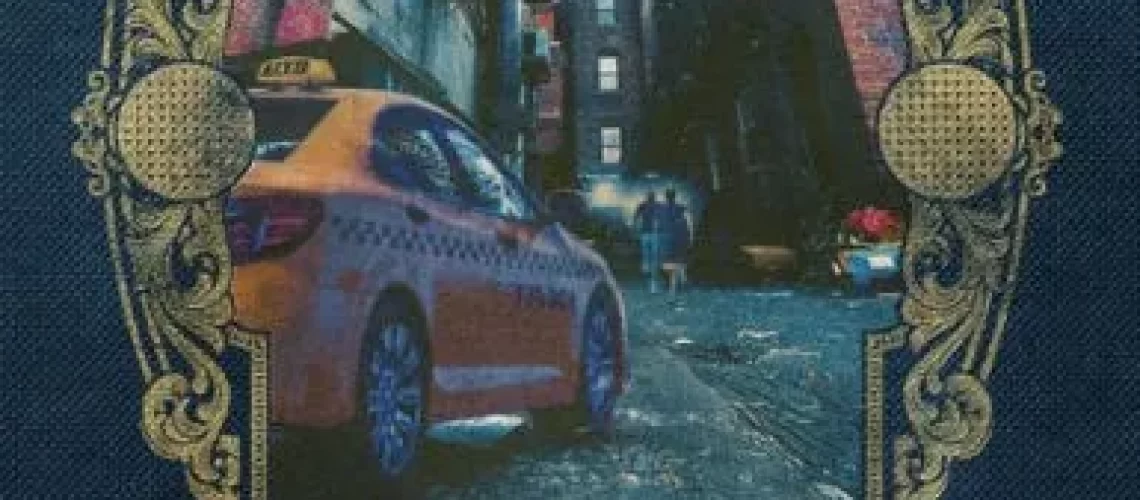“Bloodshot eyes stare at me curiously, peering out of those ski masks that cover your whole face.”
A cab driver’s stream-of-consciousness thoughts begin with this sentence, dropping the reader right into the thick of this man’s uncertain predicament and through the hours that follow. His meandering mind accompanies the various senses that his brain can register, but the confused cabbie’s last memory is pulling his vehicle into an alleyway to take a break and watch the sunrise.
And then, those eyes.
From peripheral vision he notices his windshield has been shattered. The two masked strangers—one of whom was just in the car straddling him, he thinks—are fleeing. But, his neck won’t seem to turn to look for any more details, leaving him with only the cab’s dirty ceiling to focus upon. Eventually he notices others arriving outside the car, but they don’t seem to be checking on him.
Helpless, unable to move, and with nothing but these rambling thoughts of work, family, a secret affair, and just what has transpired to him, leave the cab driver with mounting anxiety and horror. Interrupting his thoughts, he gleans fragmentary pieces of conversation from those who have arrived.
“I strain to hear them; they must be on the other side of the car because their voices were far away and hard to pick out one from the other. Even so, I feel like someone is staring at me. I can feel their eyes boring into the side of my face…
“…definitely used something—the starburst started when it got punctured, so they used something, but so many swings at it… high, maybe…Blues…”
“…-ck tar…”
“…cut for sure.”
“Yeah, Fentanyl…something.”
“Probably couldn’t even see straight…robbed him…””
The reader of L. Marie Wood’s short novella 12 Hours will realize what has happened to this cabbie long before he grasps the truth about himself. And that’s an integral part of the construction of the novella, of how Wood is directing the reader’s emotions and connection to her protagonist through his psychological horror. The cab driver is full of frailties and faults, but the reader can’t help but feel empathetic to his plight and his difficulty at reaching the obvious conclusion. His thoughts reveal a man full of realistic contradictions who both loves and wrongs, who has burst of selfish preoccupation coupled to moments of mournful sympathy for others. He looks out at the city and the inhabitants of its downtrodden corners with shades of judgment and cliché, but then also with fondness and pride where he includes himself as just another one of humanity there.
In short, Wood’s novella is a meditation on the human condition in its strengths and weaknesses, its gains and losses. It’s about one man taking stock of his existence in the face of the terror that accompanies the thin veil between life and death.
Finally realizing his exact condition, the cab driver’s thoughts become dominated with finding the person in the ski mask who has done this to him. That driving journey leads him to surprising revelation about himself and the fellow people in this world, including that ski-masked stranger that he might resemble more than he ever considered.
Kate Maruyama, the author of Bleak Houses, the first volume of this series of novellas from Raw Dog Screaming Press, writes in her afterward to 12 Hours:
“[Wood’s] descriptions and rhythm carry us along in a staccato that reveals the world through images, thoughts, and an ebb and flow of franticness as our hero, making sense, reaches out, layering memory in with fact, thoughts in with observations, but keeps us riveted as we learn little things about him…
“Wood’s mastery of making the familiar strange in a way that we have to re-recognize it keeps us riveted to the disconnection of the piece. Our brains are dancing, horrified and awakened by new revelations at every page.”
I couldn’t phrase that any better or more accurately. 12 Hours works very effectively in its length, singular focus, and well-crafted prose. It’s a mood literature that embodies the hazy realm between mortality and the hereafter to resonate with the condition of our own lives. Horror does that so well.
As noted just above, 12 Hours is the second volume of the “Selected Papers from the Consortium for the Study of Anomalous Phenomena”, the new line of novellas from Raw Dog Screaming Press, edited by RJ Joseph. I was disappointed that Bleak Houses didn’t include any context for this series or its name, but presentation of this “paper” of 12 Hours is included in “A Note From the Professor” that prefaces Wood’s story. I appreciated that this was now here, but still wish the style of novellas fit into some kind of fictional shared universe of oddities under the series title organization.
The next volume in the series of novellas comes in March, Asylum by Sarah Hans, and I’m looking forward to that. But, I also will be looking now to read more from L. Marie Wood.







